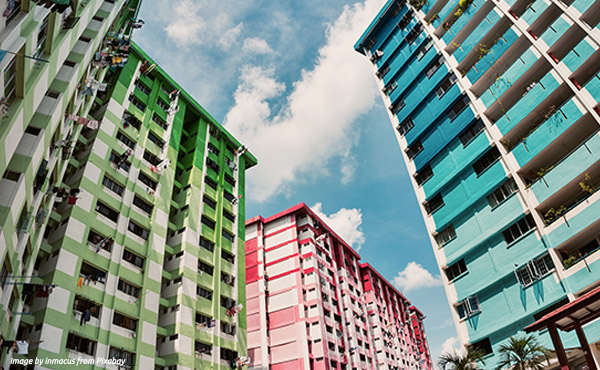Inheriting an HDB Property in Singapore: What Taxes Involved
This article provides an overview of the tax implications and considerations when inheriting an HDB property in Singapore.

Overview of Inheriting HDB Property in Singapore
In Singapore, the process of inheriting a Housing Development Board (HDB) property involves various legal and financial considerations. These include understanding the tax implications, potential maintenance fees, property taxes, and potential restrictions due to existing property ownership. Further, the inheritance may also impact future property ownership and related costs.
Case Study: Inheriting a Property with Siblings

Inheriting a property with siblings can introduce additional complexities, particularly concerning potential stamp duty issues when transferring shares of the property. For instance, if a property is inherited equally by three siblings and one of them wants to transfer their share to another sibling, this transfer may attract stamp duty.
This case study highlights the importance of proper estate planning, especially when multiple beneficiaries are involved. By setting clear terms regarding the division and management of the property in the will, potential disputes and legal complications can be minimized.
Background on Inheritance Tax in Singapore
In Singapore, the abolishment of inheritance tax in 2008 has significantly simplified the process of inheriting properties, including HDB flats. Beneficiaries no longer have to worry about this tax, which has removed a considerable burden. This tax reform has been a significant relief for many Singaporeans, as it allows them to inherit properties without the additional financial burden of inheritance tax.
However, it’s essential to understand that the cessation of inheritance tax doesn’t imply that there are no other financial implications. Other costs such as maintenance fees, property taxes, and potential stamp duties may still apply. These costs will depend largely on the type of property, its location, and whether the beneficiary decides to keep or sell the property.
Stamp Duty Implications
One potential cost associated with inheriting a property in Singapore is stamp duty. Generally, beneficiaries do not need to pay stamp duty when inheriting a residential property. For instance, if a person inherits an HDB flat from a deceased parent, they would typically not be required to pay stamp duty on this transaction.
However, certain exceptions exist to this rule. These exceptions can lead to stamp duties being applicable under specific circumstances. For instance, if the beneficiary decides to sell the inherited property within three years of receiving it, they may need to pay Seller’s Stamp Duty (SSD). Similarly, if the beneficiary decides to purchase a new property after inheriting one, they may also need to pay stamp duty as well as ABSD, depending on the timing of the purchase and the type of property bought.
Maintenance Fees and Property Tax
Upon inheriting a property, beneficiaries are required to take over the responsibility of maintenance fees and property tax. For instance, if a person inherits a condo, they will need to cater to the regular maintenance fees for the upkeep of the common areas and facilities. These fees can sometimes be quite substantial, especially for private condos that offer a wide range of facilities.
Furthermore, property tax is another financial obligation that beneficiaries need to consider. This annual tax is imposed on all property owners in Singapore, regardless of whether the property was bought or inherited. The amount of property tax depends on the annual value of the property, which is determined by the potential rental income that the property can generate.
Mortgage Considerations
When inheriting a property with an outstanding mortgage, several considerations come into play. Legally, beneficiaries are not liable for the mortgage if the deceased was the sole borrower. This means that if the original property owner had taken out a mortgage loan on their own, the beneficiaries would not be required to pay off this loan.
However, if there is an outstanding mortgage on the inherited property, the Total Debt Servicing Ratio (TDSR) assessment will come into play. This assessment is conducted by the bank and takes into account the beneficiary’s income and other financial obligations to determine whether they are financially capable of servicing the mortgage. If the beneficiary fails this assessment, they may be unable to inherit the property, highlighting the importance of financial planning when dealing with property inheritance.
Restrictions and Eligibility Criteria
Inheriting an HDB flat in Singapore comes with certain restrictions and eligibility criteria. HDB rules may restrict beneficiaries from keeping an inherited HDB flat if they already own one. For instance, if a person already owns an HDB flat and then inherits another one, they may be required to sell off one of the flats within a specified period.
Similarly, restrictions also apply if a beneficiary owns a private property and inherits an HDB flat. This rule is in line with HDB’s regulations that prohibit the simultaneous ownership of an HDB flat and a private property within the Minimum Occupation Period (MOP). In such scenarios, the beneficiary may need to sell one of the properties to comply with HDB’s rules.
Impact on Future Property Ownership
Inheriting a property can impact future property ownership and potentially result in additional stamp duties or restrictions on buying new properties. For instance, if a person inherits an HDB flat, this will count towards the total number of properties they own. If they then decide to buy another residential property, they may be subject to Additional Buyer’s Stamp Duty (ABSD), which can add a significant cost to their property purchase.
Additionally, the inherited property may affect the beneficiary’s eligibility to purchase certain types of properties. For example, if a Singaporean inherits a private residential property, they must fulfil a five-year Minimum Occupation Period (MOP) before they are eligible to purchase an HDB flat.
Legal and Financial Considerations
There are several hidden costs and financial considerations to be aware of when inheriting a property. For example, if the inherited property is a condominium, the beneficiary will be responsible for paying monthly maintenance fees, which could be quite substantial depending on the facilities and amenities provided by the condominium.
Furthermore, it’s also critical to consider potential legal issues that may arise during the inheritance process. For instance, if any disputes arise among beneficiaries regarding the division of the property, legal fees may be incurred to resolve these issues. As such, it’s advisable for beneficiaries to have open discussions with their loved ones and seek legal advice if necessary to ensure a smooth inheritance process.
Conclusion

Inheriting an HDB property in Singapore involves various tax implications and considerations. Potential beneficiaries must be aware of these issues, which include the absence of inheritance tax, potential stamp duties, maintenance fees, and property taxes. Additionally, beneficiaries should also consider how the inherited property might affect their future property ownership and potential restrictions on keeping the inherited property. Lastly, seeking professional advice to navigate the complex legal and financial landscape surrounding property inheritance is always advisable.












